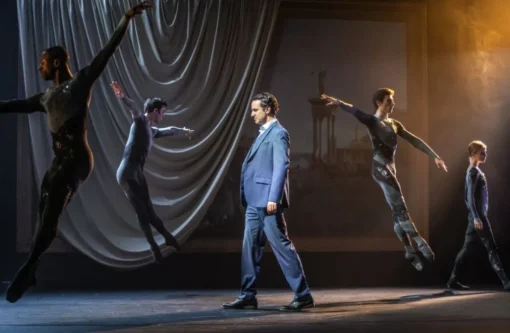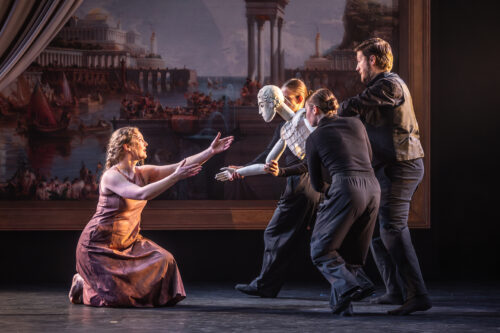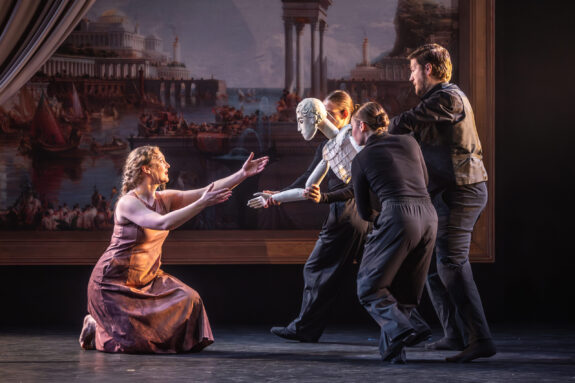 United Kingdom London Handel Festival 2025 – Apollo e Dafne (HWV122) and The Choice of Hercules (HWV69): Soloists, La Nuova Musica / David Bates (conductor) with New English Ballet Theatre. Shoreditch Town Hall, 27.3.2025. (AK)
United Kingdom London Handel Festival 2025 – Apollo e Dafne (HWV122) and The Choice of Hercules (HWV69): Soloists, La Nuova Musica / David Bates (conductor) with New English Ballet Theatre. Shoreditch Town Hall, 27.3.2025. (AK)

The genre of opera in Baroque times often used storylines from Greek mythology, performances were often presented as exciting spectacles.
Stage director Thomas Guthrie took two Handel compositions, a cantata and an oratorio, and has successfully created a highly dramatic and highly musical grand spectacle of a two-act opera. Shoreditch Town Hall proved to be the ideal venue to house such a high-quality festive celebration of Handel and Baroque opera.
Act I of Guthrie’s opera is the Italian cantata Apollo e Dafne (HWV122), completed sometime in 1709-10. Act II is the English oratorio The Choice of Hercules (HWV69) which Handel composed in 1750 (and premiered in 1751), some forty years after Apollo e Dafne.
With Guthrie’s concept the sets remain the same (or similar) in both acts, and with highly expressive ballet added to the narration throughout, the two stories of temptation and resistance blend into a credible whole. Act I tells the story of the God Apollo who passionately and arrogantly pursues the nymph Dafne who, to be protected, turns into a laurel tree leaving Apollo heartbroken. Act II presents the predicament of the boy Hercules who is being tempted by Pleasure and Virtue, the latter of which wins.
Act I started with six dancers using masques: was this a nod to the genre of the sixteenth-seventeenth century masque which was a popular Court entertainment before Handel’s time? Or was this a nod towards Act II where Hercules would not appear as a flesh and blood youth? It is possible that the masques were meant to be only imaginatively used props – reminding me of Ashton’s artistically integrated props in his ballet La fille mal gardée – alongside umbrellas which were also used in the imaginative choreography.
Guthrie used all available space, possibly to indicate heaven, earth and onlookers (or Greek Chorus?). Solo singers often sang from high above the stage; the chorus sang from balconies to the left and right of the stage.
Handel provided concertante instrumental solos to accompany several of his arias. Guthrie often placed his solo instrumentalists on the same high level as the singers. However, on one occasion, the solo violinist was placed into the auditorium.

Hercules was represented by a puppet, skilfully manipulated by two puppeteers and – astonishingly – by the singer who eventually gave voice to Hercules. This is not the first time that a puppet represents a person on the operatic stage. In his 2012-13 staging of Madam Butterfly for the English National Opera, the late Anthony Minghella used a small puppet (the size of a three-year old child) and three puppeteers for the presentation of Sorrow. However, this time the Hercules puppet is on the stage all way through (for about an hour) and successfully portrays all emotions which are declared by the text and indicated by the music. The puppet is only a bust with a head but its imaginative use fooled me into thinking that I saw an adult-size puppet. Amazingly, the puppet even ‘danced’ during a joyous choral number.
As an ex-instrumentalist, I am in awe of Leo Duarte (solo flute and solo oboe) and Beatrice Philips (solo violin). They were high up, playing all their concertante parts from memory, fitting perfectly not only with singers of the relevant arias but also with the orchestra deep below. And they also delivered solo passages (minus singers) with immense musicality and virtuosity.
The memory I brought home after the performance was not about individual singers – all of whom excelled – but about stage director Thomas Guthrie whose musicality, inventions and courage combined into a great piece of Baroque theatre.
Guthrie was greatly helped by conductor David Bates, all singers, dancers and orchestral players, as well as the wholly satisfying visuals such as lighting and costumes.
This was a Guthrie show of excellence but, nevertheless, I particularly enjoyed the velvety voice of Bethany Horak-Hallett (Virtue) and I will never forget countertenor James Hall’s beautiful delivery of Hercules’s vocal lines while manipulating his alter ago puppet.
Agnes Kory
Production:
Director and Puppetry direction – Thomas Guthrie
Choreographer – Valentino Zucchetti
Designer – Francisco Rodriguez-Weil
Lighting director – Emma Chapman
Hair and Make-up – Tess Bevan
Assistant Director – Oscar Simms
Hercules puppet designed and made by Madarave
Masks designed and made by Ruth Paton
Cast;
Apollo – Dan D’Souza
Dafne – Lauren Lodge-Campbell
Hercules – James Hall
Pleasure – Madison Nonoa
Virtue – Bethany Horak-Hallett
Puppeteers – Tabitha Bingham and Ellie Peacock
